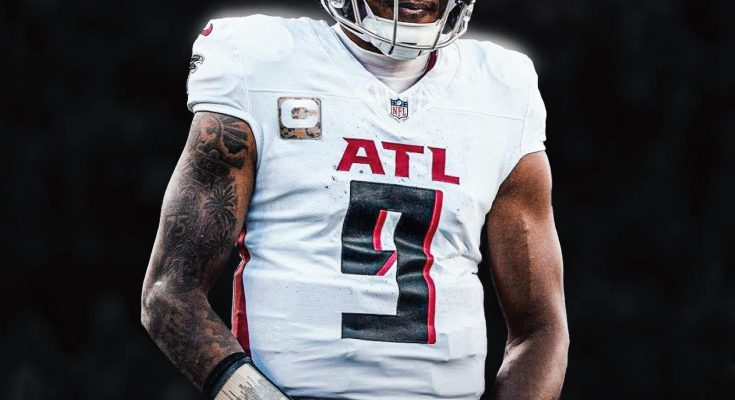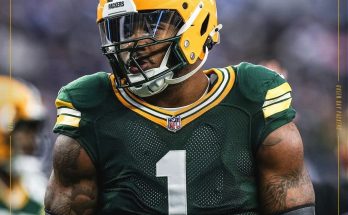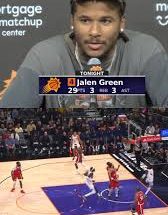The comments from Michael Penix Jr. about where he gets his in-game support and how he processes feedback have stirred up a wave of speculation, not only about his own developmental arc but also about the internal dynamics of the Atlanta Falcons. When a rookie quarterback — especially one drafted as highly and controversially as Penix Jr. — publicly states that he doesn’t receive real-time guidance from coaches or teammates on the sideline, naturally the football world reacts. It raises questions about communication, mentorship, coaching philosophy, locker-room dynamics, and the overall structure the Falcons have created around their quarterback situation. And because Atlanta spent a top-10 pick on Penix just months after signing Kirk Cousins to a major contract, everything involving either quarterback is already magnified by a unique level of scrutiny.
When Penix explained that he leans more on his fiancée for emotional support and a personal quarterback coach back home for technical feedback, the comments were more nuanced than the viral summaries made them sound. He wasn’t suggesting he’s isolated or unsupported as a person; he was emphasizing that the on-field corrections he hears most often don’t come from Falcons players or coaches during games. According to him, the sideline isn’t where he gets detailed mechanical advice, and he doesn’t have a tradition of conferring extensively with other quarterbacks in the moment. For emotional grounding, he turns to the person closest to him — someone who knows him outside the football bubble — and for technical refinement, he turns to a personal coach who has been part of his process for years. In a vacuum, that’s not shocking. Many players rely on offseason coaches for mechanical adjustments, and many lean on family for emotional support. But because this involves a young franchise quarterback and a team trying to build a long-term plan around him, his words landed with a different weight.
The viral storyline — that Penix sits alone on the sideline and gets no guidance from anyone — is a simplification, but it didn’t emerge from nowhere. Cameras have repeatedly shown him off to the side, helmet on, seated by himself, focused quietly. At first it seemed like the typical image of a backup quarterback deep in thought, studying the game and waiting for a chance that may not come until years down the road. But as the season progressed and the Falcons’ offense struggled with Cousins under center, and as fans began openly wondering when Penix might see meaningful snaps, those images of him alone took on a different symbolic meaning. Supporters began to question whether the team had put him in an environment conducive to development. Critics wondered if Cousins, long known for being meticulous and involved, had not taken his presumed successor under his wing as expected. The result is a debate about optics, communication, and player development that gained traction once Penix’s own words were added to the mix.
What’s important to recognize is that Penix’s answer wasn’t hostile, accusatory, or frustrated. He didn’t imply that coaches ignore him or that teammates shut him out. He simply described his process and the relationships he leans on. But the NFL is an environment built on structure, constant communication, and the belief that the quarterback room is one of the most important collaborative spaces in any professional sport. If a young quarterback suggests publicly that he’s not receiving in-game guidance, even unintentionally, that introduces doubt about whether the team is maximizing his development. Fans and media immediately connect the dots: is he not getting coached? Is he not being mentored? Is he on an island during games? And why would a rookie quarterback — who presumably should be absorbing as much as possible from experienced veterans — turn primarily to a private coach outside the building?
The Falcons’ quarterback dynamic adds another layer. Cousins was signed to a major four-year contract, but it’s structured such that Atlanta can move on after two seasons without crippling financial consequences. Drafting Penix in the top ten was widely interpreted as a future-planning move, but also one that would inevitably create an awkward coexistence. Cousins has always presented himself as a professional willing to help teammates, but he is also someone who understands the precarious nature of NFL job security. He’s been in quarterback competitions, has been franchise-tagged twice, and has seen teams hesitate to commit to him long-term. For a veteran in his mid-30s, the idea that the team’s top draft investment is a quarterback who could replace him sooner than later naturally creates a complicated environment.
Still, many expected that Cousins would serve as a mentor to Penix, if only because it’s the norm for veteran starters in situations where a highly drafted rookie sits behind them. In some quarterback rooms, the mentorship is genuine: the older player helps the younger player learn the system, understand defensive disguises, navigate the rhythm of preparation, and absorb the nuances of game management. In other cases, the mentorship is more of a surface-level politeness — the rookie can observe, learn from the veteran’s habits, and ask questions, but the starter maintains professional boundaries. And then there are quarterback rooms where the two barely interact beyond what’s required by meetings. There’s no evidence that the Falcons fall into the least cooperative category, but Penix’s comments created speculation that perhaps the relationship is more distanced than external observers hoped.
It doesn’t help that the Falcons’ season has been uneven. When a team wins and looks sharp, nobody worries about the backup quarterback’s development. When a team struggles, everything becomes a storyline. The offense has lacked rhythm, and Cousins is coming off a major injury that has raised fair questions about his physical recovery and long-term ceiling. As the team has stagnated, fans naturally start looking toward the rookie they were told represents the future. So when he’s seen sitting alone, when he says he doesn’t talk to other quarterbacks about on-field adjustments, when he hints that his personal coach gives him more technical notes than the team does during games, all those observations become fuel for speculation about mismanagement.
But there’s also another interpretation — one that reflects both Penix’s personality and his developmental stage. Penix is known for being calm, composed, and internal. His Washington teammates consistently described him as someone who processes things quietly, keeps his emotions under control, and doesn’t need constant external dialogue to stay centered. Some players thrive on sideline conversations, constant back-and-forths with coaches, and real-time adjustments. Others settle into themselves, study photos or tablets silently, and take feedback in structured settings like film review rather than chaotic real-time environments. Penix may simply be the latter type, and his comments may reflect personal preference more than an indictment of the Falcons’ structure.
There’s also the possibility that Atlanta prefers not to overload him during games. If the plan is to keep him behind Cousins for at least one year, then the coaching staff may believe that in-game micromanagement of a player who won’t be taking snaps isn’t necessary. Some teams coach their backups heavily from the sideline; others treat game days as observational experiences. If Penix is meant to be absorbing the flow of the game rather than preparing to enter it, the staff may be intentionally keeping things light. That approach can be debated — some argue backups should be coached as if they could enter at any moment — but it’s not unusual. The Falcons may believe his development is better served through practice reps, classroom learning, and offseason refinement with his personal coach, who knows his mechanics intimately.
Still, the optics matter. When the face of your franchise sits alone in front of millions of viewers, when his own words imply that his most substantive feedback comes outside the building, and when the starter is playing inconsistently, the perception becomes that something is off. And perception has power in the NFL — not just in media cycles but in locker rooms, where players are highly attuned to signals about leadership and team direction.
The reality is that nothing Penix said suggests conflict or dysfunction, but it does highlight a subtle tension within the Falcons’ current design. They drafted a quarterback for the future, but the structure around him is shaped by a present still controlled by a high-priced veteran. They want Penix to grow, but they need Cousins to win now. They want cohesion, but they have two quarterbacks whose timelines intersect awkwardly. And they want to project stability, yet the optics of their sideline dynamic invite questions.
What happens next will depend heavily on how the team performs, how Cousins stabilizes, and how Penix continues to develop. If Atlanta starts winning, this storyline will fade. If the offense continues to stumble, the pressure to accelerate Penix’s development — and perhaps to give him real playing time — will grow. And if he eventually becomes the starter, his comments will be reinterpreted retroactively either as harmless background noise or early signs of a misaligned developmental approach.
For now, what’s clear is that Penix is grounded, supported by people he trusts, and committed to improving through the channels he believes work best for him. Whether those channels align perfectly with what fans expect from a franchise quarterback is another matter entirely, but it does not inherently mean the Falcons are neglecting him. It simply means he is navigating the early stages of his NFL journey in the way that feels most natural to him — quietly, internally, and with a focus on long-term growth rather than sideline conversations.



